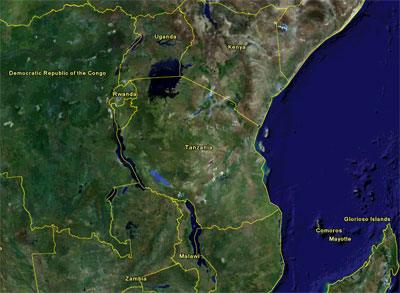ZIMBABWE
Please note, this page is not longer being updated. For more recent information, please see news.mongabay.com and use the search function to find the country feed. For more up-to-date data on forest cover and loss, check out Global Forest Watch.
| Zimbabwe Forest Figures
Forest Cover Total forest area: 17,540,000 ha % of land area: 45.3% Primary forest cover: n/a % of land area: n/a % total forest area: n/a Deforestation Rates, 2000-2005 Annual change in forest cover: -313,000 ha Annual deforestation rate: -1.7% Change in defor. rate since '90s: 16.4% Total forest loss since 1990: -4,694,000 ha Total forest loss since 1990:-21.1% Primary or "Old-growth" forests Annual loss of primary forests: n/a Annual deforestation rate: n/a Change in deforestation rate since '90s: n/a Primary forest loss since 1990: n/a Primary forest loss since 1990:n/a Forest Classification Public: n/a Private: n/a Other: n/a Use Production: 10.1% Protection: 2.8% Conservation: n/a Social services: n/a Multiple purpose: 87.1% None or unknown: n/a Forest Area Breakdown Total area: 17,540,000 ha Primary: n/a Modified natural: 17,385,000 ha Semi-natural: n/a Production plantation: 154,000 ha Production plantation: n/a Plantations Plantations, 2005: 154,000 ha % of total forest cover: 0.9% Annual change rate (00-05): n/a Carbon storage Above-ground biomass: 843 M t Below-ground biomass: 226 M t Area annually affected by Fire: n/a Insects: n/a Diseases: n/a Number of tree species in IUCN red list Number of native tree species: 1,747 Critically endangered: 0 Endangered: 2 Vulnerable: 12 Wood removal 2005 Industrial roundwood: 1,185,000 m3 o.b. Wood fuel: 10,381,000 m3 o.b. Value of forest products, 2005 Industrial roundwood: $59,047,000 Wood fuel: n/a Non-wood forest products (NWFPs): n/a Total Value: $59,047,000 More forest statistics for Zimbabwe |
Between 1990 and 2005, Zimbabwe lost 21 percent of its forest cover. The country has no primary forests left, and deforestation rates have increased by 16 percent since the end of the 1990s.
Despite this degradation, Zimbabwe has some 1,747 species of trees among its 4,500 species of higher plants. The country is also home to a number of safari animals like elephants, lions, and hippos. In total 270 species of mammals are found in Zimbabwe along with 180 reptiles and 661 birds.
From a tourism standpoint, Zimbabwe is best-known internationally for Victoria Falls and the Zambezi river. On paper, 14.7 percent of the country is under some form of protection.
Zimbabwe has one of the highest rates of AIDS infection on the planet, and population growth rates have fallen significantly in the past decade to 1.1 percent (without AIDS the population growth rate would be 2.5 percent). Today, because of AIDS, life expectancy in Zimbabwe has fallen from 64.9 to 39.2, almost a 40 percent decrease.
Zimbabwe is a major exporter of crocodile skins.
Suggested reading - Books
- The Rough Guide to Zimbabwe
- Culture and Customs of Zimbabwe
- The Battle for Zimbabwe: The Final Countdown
Unless otherwise specified, this article was written by Rhett A. Butler [Bibliographic citation for this page]
Other resources
Contact me if you have suggestions on other rainforest-related environmental sites and resources for this country.

Image copyright Google Earth, MDA EarthSet, DigitalGlobe 2005
CIA-World Factbook Profile
FAO-Forestry Profile World Resources PFD
Last updated: 4 Feb 2006
